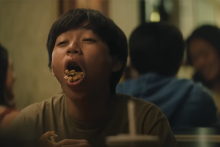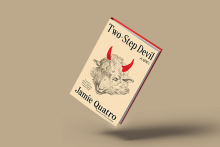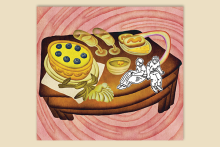Arts & Culture

A musical about Tammy Faye Messner, more widely known by her former name, Tammy Faye Bakker, seems odd at first. But the Broadway stage feels like the right place for the rise and fall of televangelism to play out. Televangelism, after all, is meant to be a spectacle. And its shadow of corruption, sex, and money only add to the theatrics of it all.

The season is stuffed (pun fully intended) with stress, loved ones, and remembering to share our blessings with others. These films remind me of those feelings.

Heretic is a litany of theological inquiries wrapped in the skin of a horror movie. Like Legion, the frights of directors Scott Beck and Bryan Woods’ film are many, but its biggest scare isn’t demonic or paranormal or gory: It’s the unique terror of being caught in a theological conversation with a self-righteous man.

MAYBE YOU FIRST saw it while sitting in the waiting room of the doctor’s office — a Fox News banner update across the bottom of the screen. Or perhaps you saw the hashtag on X or Threads. Maybe you’re following the story as internet sleuths exchange theories on Reddit. Here’s what you know: There’s an SUV making its way from California to Washington, D.C., driven by a man and a woman in their 20s. They’re transporting some sort of nuclear device, and they plan to blow up the president. And, for some reason, law enforcement isn’t taking this very seriously.
It’s the story of the moment. Even though nobody has any real facts. Everyone just knows we’re collectively watching a disaster unfold.
Such is the setup for Jason Pargin’s I’m Starting to Worry About this Black Box of Doom, a parable of the dangers of the information age. Pargin’s witty, incisive novel illustrates how social media has eroded our ability to trust each other.

AROUND MY NECK hangs a cross made of polished pear wood and brushed steel. Growing up, I was taught that it was a timeless, universal reminder of Christian faith. But as Nijay K. Gupta reveals in a new book, Strange Religion, it can also be seen as a tangible reminder of another truth: The earliest Christians were weird.
As Gupta writes, “Weird is not always bad ... weird can be good. But weird can also be dangerous.” This danger was precisely why the earliest Christians were regarded with suspicion, even fear, by the Romans. “Christians had no temples, no priests, and no cult statues,” Gupta writes. “They had no sacred legends or texts of their own in the first century. ... They went out and intentionally tried to spread their religious practices far and wide.” Because the power of the Roman Empire depended on the strength of its civic religion and practices, “this naturally brought [early Christians] under suspicion” by the authorities. A threat to the religious status quo was seen as directly undermining the stability of the state.
Gupta focuses his latest book on the decades after the crucifixion when the church was becoming established.

Unholy Power
Kristin Kobes Du Mez and Carl Byker’s short documentary, For Our Daughters, displays the evangelical church’s dangerous pattern of protecting abusive men — from the pulpit to the White House — to maintain social and political power, often to the detriment of women. www.forourdaughtersfilm.com

THERE IS SOMETHING horrendous about the politics of being 13 — the raging hormones, the prepubescent brinkmanship; nobody knows what they’re doing, and everyone wants you to think that they do. Such is the case for Chris Wang (played by Izaac Wang), aka Wang Wang, aka Dìdi, aka Half-Asian Chris (he’s not actually half-Asian). Chris is having a bit of an identity crisis.
Director Sean Wang’s Dìdi is a love letter to adolescence rendered with painstaking specificity, a period piece set in his own childhood home of Fremont, Calif., during the era of T9 texting and AOL instant messenger.
It’s the summer before freshman year in 2008 and Chris is getting into shenanigans: skating with his friends, wondering if he should send a :) or a ;) to his crush, and generally feeling emotions nobody else could possibly understand. Plus, his mother keeps arguing with his grandmother and asking if he’s feeling sad — so annoying. And his sister, who sucks, obviously, is leaving for college, but at least she has good taste in music (or rather, she likes the same music as Chris’ crush).
There is such frenetic volatility to early adolescence.

Directed by Oscar-winner Edward Berger (All Quiet on the Western Front), Conclave begins when the pope dies unexpectedly. To elect the next pontiff, the College of Cardinals convenes in the Vatican, entering total seclusion from the outside world until a majority vote can be reached. But if God is working through the cardinals, so too is something darker: ugly hunger for power and bitter ideological divide.

In the first few moments of Exhibiting Forgiveness, La’Ron (John Earl Jelks) is beaten after he defends a store clerk in a convenience store robbery. The violence, like most of the violence in the film, is just out of view. Soon the scene shifts and Tarrell (André Holland) wakes from a nightmare. His wife Aisha (Andra Day) reassures Tarrell that he is safe in the beautiful world they are building for themselves as artists and parents.

Horror fiction is one of the first spaces to grapple seriously with concerns of justice. (No, really!)
With that in mind, I present five movies you can watch during spooky season that will not only thrill and chill you, they’ll also spur you to think and act for justice.

In August 2022, Mennonite minister Rev. Michael Gulker brought together 12 pastors of different denominations from Grand Rapids, Mich., with a unique proposal — to spend a year together exploring their differences with the hope of finding a way beyond them.

When my friend introduced me to pop artist Chappell Roan this past April, I had no idea who she was. Now, nearly six months later, I hear about Chappell Roan (the stage name for Kayleigh Rose Amstutz) daily. From drawing massive crowds at Lollapalooza to having one of the most streamed albums of the summer, Roan’s quick rise to fame has been impressive.
My friend described Roan as the “situationship singer.” A “situationship” a term coined by Generation Z, is a noncommittal or undefined romantic or sexual relationship. “Casual,” the fifth track on Roan’s The Rise and Fall of a Midwest Princess, grieves a situationship. In it, Roan describes a relationship that fails to evolve into something beyond a pattern of casual, sexual encounters. There’s a confession in Roan’s bridge that’s so honest and unexpected, that it took me by surprise upon first listen. She says, “I try to be the chill girl that / Holds her tongue and gives you space / I try to be the chill girl but / Honestly, I’m not.”
For those who grew up in the conservative Christian world as Roan did, lamenting casual sex is familiar territory. But Roan and other Gen Zers aren’t lamenting casual sex, hookup culture, or situationships because they believe their “sexual purity” is tied to their salvation. Rather, they seem to be lamenting a sex-positive culture that doesn’t live up to the hype.

As a missiologist and practical theologian, I can’t help but appreciate the multiple depictions of an embodied faith throughout the drama, in patterns of both faithfulness and dysfunction.

Flamy Grant called in to her morning interview after participating in a day-long silent retreat. Well, not a silent retreat exactly — it was a vocal rest.
After spending the last year touring the U.S. off the success of her album, Grant, who prefers to use her stage name in interviews, needed to rest her voice. Since her rise to Christian music stardom — or infamy, depending on how one feels about a drag queen topping the Christian charts — she has performed in bars, clubs, and churches spreading the good news in glitter.

AS A JOURNALIST trained never to bury the lede, there is a snake in my house. It’s a distressing creature that slithers away into parts unknown when you try to capture it. The presence of this snake is deeply disturbing. Yet no matter how close I come to grabbing it — even with Grill Pro’s extended-length barbecue tongs (18 inches is as close as I’m going to get) — it always gets away, only to appear again in a different location.
It’s my fault, of course. Years ago, I allowed the creature into my house as a show of support for a granddaughter to whom all life is sacred. The Supreme Court also believes that all life is sacred, depending on which state you live in. But even if I took the reptile across state lines, I’d have to catch it first (with the above barbecue tongs), which I haven’t.

I once believed I could hate intermittently,
an incandescence I could turn on and off
with the will or guide with the pressure
of my knees or with reins woven
from the clear demands of the moment.

THE WORD “PROPHETIC” gets thrown around a lot in Christian circles. The adjective carries both an ancient heft and a forward-looking fire, the perfect jolt of biblical energy for the nouns that need it: a prophetic book, a prophetic sermon, a prophetic Instagram infographic. But living prophets, especially the self-anointed ones, aren’t so easily marketable. They’re stubborn and strange, somehow arrogant enough to believe they speak for an invisible God who turns out to be, more often than not, extremely angry at large swaths of humanity.
Two-Step Devil, the second novel of rising literary voice Jamie Quatro, places one such character in the contemporary South. Known simply as The Prophet, Quatro’s lonesome protagonist lives in the kudzu-entangled backwoods of northeastern Alabama, where he paints visions of impending holy war on junkyard scraps. He’s the kind of person who can “walk around behind the world’s curtain” — glimpse the spiritual stakes behind the drudgery of familiar, if fragile, social conditions. After rescuing a teenage girl from a sex-trafficking scheme, he’s confident he’s found the one who will deliver his apocalyptic message to the White House. While he’s frail and tormented by self-doubt, she’s young and, in his eyes, innocent. Meanwhile, the girl, Michael, must pull off an urgent mission of her own.

“LOOK FOR SHOOTING stars,” I texted my daughter who was working nights last August. After getting home around 3 a.m., she and her friend watched the annual Perseid meteor shower from our yard in rural Georgia. They saw a few faint streaks in the sky but nothing spectacular. Her friend was bleary-eyed and ready to go in, but Zora kept her eyes on the horizon. Then it happened: A streak of white with a smoky blue tail hurtled through the sky and took their breath away. Several years ago, my husband saw a similar meteor, one that lasted long enough for him to proclaim throughout its sparkly display, “Holy smoke!!!”
Meteor showers are not the only luminous rewards for those who walk in darkness. Leigh Ann Henion’s new book Night Magic (Algonquin Books) serves as both guide and advocate for honing our night vision and waiting long enough to be surprised. Synchronous fireflies, luminescent glowworms, and fragrant night-blooming flowers are among the many wonders illuminating Henion’s Appalachian nocturnal habitat

Living Room Theology
Hosted by theologian Grace Ji-Sun Kim, the Madang podcast features erudite conversations with scholars, ministers, activists, and more. Named after the courtyards found in traditional Korean homes, the show provides an inviting, intimate space to envision a more just world. The Christian Century
